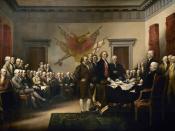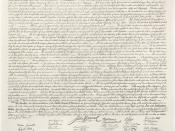Deism and Thomas Jefferson Deism, which reached its peak in the American colonies around the middle of the eighteenth century, is defined as a belief in the existence of a God or Supreme Being but denial of open religion, centering belief on the light of nature and reason. Deists opposed the Calvinistic doctrines of original sin, divinity of Jesus, limited atonement, and predestination (Lindell). The religious principles of deism were set forth by Lord Herbert of Cherbury who is generally regarded as the founder of the movement (American Lit.). However, deism was not an organized religious movement; it existed in the writings of individuals who expressed their personal religious beliefs. The enlightenment as such was confined to a limited number of highly educated, articulate people whose careful reasoning was followed only by others of like turn of mind (American Lit.). Among the enlightened with similar opinions in relation to deism were Thomas Paine, Benjamin Franklin and Elihu Palmer.
In the course of comparing the writings of these individuals and in a letter written to Dr. Benjamin Rush, one can conclude that deism was present in the personal beliefs of Thomas Jefferson.
Thomas Jefferson was a fervent believer in the equality of man and theoretically held that God had ordained it. His words, written in the Declaration of Independence ""æhold these truths to be self evident: that all men are created equal; that they are endowed by their Creator with CERTAIN [inherent and] inalienable rights; that among these are life, liberty, and the pursuit of happiness"� (Lauter, 919). Jefferson believed that our rights came from God, not from the British crown, so it was up to us what kind of government we wanted to recognize. If you could sum up Jefferson's political views in one sentence, you would say: He...


